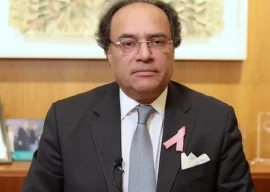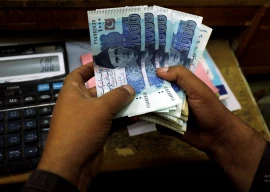
Finance Minister Muhammad Aurangzeb announced that Pakistan plans to issue Eurobonds to raise foreign financing in the fiscal year 2025-26, contingent on the anticipated upgrade of the country's credit rating to category 'B' by global rating agencies in the coming months. The minister also mentioned the potential launch of a panda bond in the near term.
In addition to approaching the International Monetary Fund (IMF) for climate funding worth $1 billion, Pakistan is actively engaging with the World Bank (WB), Asian Development Bank (ADB), and Asian Infrastructure Investment Bank (AIIB) to secure further climate financing. The ongoing digitalisation of the domestic economy, Aurangzeb noted, is expected to curb corruption within the Federal Board of Revenue (FBR).
Speaking to the media on the sidelines of the Securities and Exchange Commission of Pakistan's (SECP) launch of the 'Electronic Mortgage Register' on Tuesday, Aurangzeb stated, "We will access international capital markets once our rating is upgraded to the single 'B' category; however, we may launch a panda bond prior to the ratings upgrade."
He shared that the government has held productive discussions with global credit rating agencies, including S&P, Fitch, and Moody's, in Washington. "We have been engaging with these agencies over the past six months, which led to the initial rating upgrade in July-August 2024. We anticipate a further upgrade to the 'B' category within the next few months," he said.
Earlier, the government had set a target to float $2 billion in Eurobonds in the fiscal year 2024-25 and raise an additional $300-500 million through the issuance of a panda bond, primarily in Chinese markets. This financing would enhance Pakistan's capacity to repay foreign debt and support economic growth.
Aurangzeb clarified, "To be specific, I see Pakistan returning to the Euro or US markets to launch Eurobonds not in the current fiscal year (FY25) but in the next fiscal year (FY26)."
The minister also mentioned that Pakistan held fruitful meetings with the IMF to secure climate financing, and an IMF team will visit Pakistan next month for further discussions. In addition to the IMF, Pakistan is pursuing climate funding discussions with the World Bank, ADB, and AIIB.
"I had a productive meeting with the AIIB vice president today regarding climate funding," Aurangzeb said, adding, "Pakistan needs to clearly define its climate projects, including their structure, monitoring, and reporting mechanisms, to access climate financing. We need to do our homework first."
The finance minister highlighted that inflows from overseas Pakistani workers remain robust. "Based on this trend, we are confident that Pakistan's foreign exchange reserves, held by the State Bank of Pakistan (SBP), will reach $13 billion by the end of June 2025, providing a three-month import cover," he added.
"For the rating agencies, a three-month import cover, equivalent to $13 billion in foreign reserves, is a critical indicator of economic sustainability," stressed Aurangzeb.
Aurangzeb further noted that the government is working to attract investments from the local business community by addressing key issues, including tax burden reduction for the manufacturing sector, lower energy and electricity costs, and reduced interest rates.
"We have already reduced the interest rate. The Karachi Interbank Offered Rate (KIBOR), which indicates interbank lending rates, has dropped to 13% after a recent policy rate cut of 250 basis points, bringing it down to 15%," he said. "We expect KIBOR to decline further as we continue on this path."
During his address at the SECP's 'Electronic Mortgage Register' launch, Aurangzeb stated that digitalisation would eliminate corruption within the FBR. "The ongoing digitalisation will end the culture of facilitation and speed money within the FBR," he affirmed.
The finance minister noted that Pakistan's key allies, including Saudi Arabia, the UAE, Qatar, and China, are supportive and eager to invest significantly in the country. "Now, the ball is in our court to present attractive projects to global investors," he said.
He added that while the economy has stabilised, regulators and banks must play a pivotal role in advancing the economy toward a growth phase.
SECP Chairman Akif Saeed also announced that the commission is collaborating with the World Bank to develop a corporate insolvency framework. Saeed noted that the SECP would soon gain authority to oversee small companies' mergers and acquisitions, a function currently performed by the courts.




1730854420-0/plaqueboymax-(1)1730854420-0-165x106.webp)













COMMENTS
Comments are moderated and generally will be posted if they are on-topic and not abusive.
For more information, please see our Comments FAQ